Editor’s Note: This is the twelfth chapter of Romulus, by Jacob Abbott (published 1902).
XII. The Sabine War
While the negotiations with the Sabines were still pending, Romulus became involved in another difficulty, which for a time assumed a very threatening aspect. This difficulty was a war which broke out, somewhat suddenly, in consequence of the invasion of the Roman territories by a neighboring chieftain named Acron. Acron was the sovereign of a small state, whose capital was a town called Cænina. This Cænina is supposed to have been only four or five miles distant from Romulus’s city,—a fact which shows very clearly on how small a scale the deeds and exploits connected with the first foundation of the great empire, which afterward became so extended and so renowned, were originally performed, and how intrinsically insignificant they were, in themselves, though momentous in the extreme in respect to the consequences that flowed from them.
Acron was a bold, energetic, and determined man, who had already acquired great fame by his warlike exploits, and who had long been watching the progress of the new colony with an evil eye. He thought that if it were allowed to take root, and to grow, it might, at some future day, become a formidable enemy, both to him, and also to the other states in that part of Italy. He had been very desirous, therefore, of finding some pretext for attacking the new city, and when he heard of the seizure of the Sabine women, he thought that the time had arrived. He, therefore, urged the Sabines to make war at once upon the Romans, and promised, if they would do so, to assist them with all the forces that he could command. The Sabines, however, were so unwilling to proceed to extremities, and spent so much time in negotiations and embassies, that Acron’s patience was at length wholly exhausted by the delays, and he resolved to undertake the extermination of the new colony himself alone.
So he gathered together a rude and half-organized army, and advanced toward Rome. Romulus, who had been informed of his plans and preparations, went out to meet him. The two armies came in view of each other on an open plain, not far from the city. Romulus advanced at the head of his troops, while Acron appeared likewise in the fore-front of the invaders. After uttering in the hearing of each other, and of the assembled armies, various exclamations of challenge and defiance, it was at length agreed that the question at issue should be decided by single combat, the two commanders themselves to be the champions. Romulus and Acron accordingly advanced into the middle of the field, while their armies drew up around them, forming a sort of ring within which the combatants were to engage.
The interest which would be naturally felt by such an encounter, was increased very much by the strong contrast that was observed in the appearance of the warriors. Romulus was very young, and though tall and athletic in form, his countenance exhibited still the expression of softness and delicacy characteristic of youth. Acron, on the other hand, was a war-worn veteran, rugged, hardy, and stern; and the throngs of martial spectators that surrounded the field, when they saw the combatants as they came forward to engage, anticipated a very unequal contest. Romulus was nevertheless victorious. As he went into the battle, he made a vow to Jupiter, that if he conquered his foe, he would ascribe to the god all the glory of the victory, and he would set up the arms and spoils of Acron at Rome, as a trophy sacred to Jupiter, in honor of the divine aid through which the conquest should be achieved. It was in consequence of this vow, as the old historians say, that Romulus prevailed in the combat. At all events, he did prevail. Acron was slain, and while Romulus was stripping the fallen body of its armor on the field, his men were pursuing the army of Acron, for the soldiers fled in dismay toward their city, as soon as they saw that the single combat had gone against their king.
Cænina was not in a condition to make any defense, and it was readily taken. When the city was thus in the power of Romulus, he called the inhabitants together, and said to them, that he cherished no hostile or resentful feelings toward them. On the contrary, he wished to have them his allies and friends, and he promised them, that if they would abandon Cænina, and go with him to Rome, they should all be received as brothers, and be at once incorporated into the Roman state, and admitted to all the privileges of citizens. The people of Cænina, when the first feelings of terror and distress which their falling into the power of their enemies naturally awakened, had been in some measure allayed, readily acquiesced in this arrangement, and were all transferred to Rome. Their coming made a great addition not only to the population and strength of the city, but vastly increased the celebrity and fame of Romulus in the estimation of the surrounding nations.
This victory over Acron, and the annexation of his dominions to the Roman commonwealth, are considered of great historical importance, as the original type and exemplar of the whole subsequent foreign policy of the Roman state;—a policy marked by courage and energy in martial action on the field, and by generosity in dealing with the conquered; and which was so successful in its results, that it was the means of extending the Roman power from kingdom to kingdom, and from continent to continent, until the vast organization almost encircled the world.
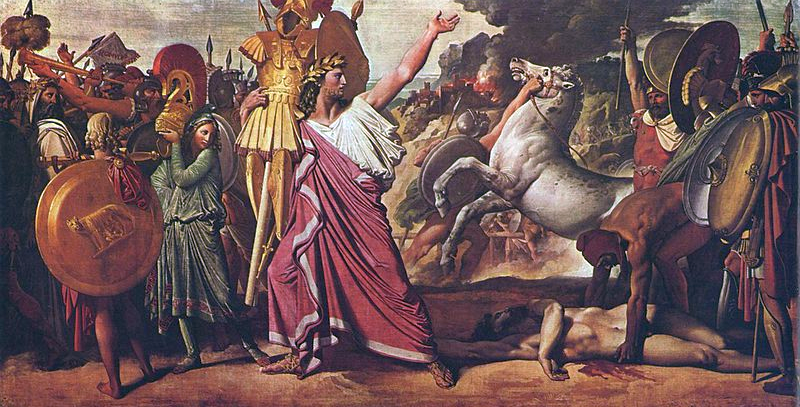
Romulus faithfully fulfilled the vow which he had made to Jupiter. On the return of the army to Rome, the soldiers, by his directions, cut down a small oak-tree, and trimming the branches at the top, and shortening them as much as was necessary for the purpose, they hung the weapons and armor of Acron upon it, and marched with it thus, in triumph into the city. Romulus walked in the midst of the procession, a crown of laurel upon his head, and his long hair hanging down upon his shoulders. Thus the victors entered the city, greeted all the way by the shouts and acclamations of the people, who had assembled,—men, women, and children,—at the gates and upon the tops of the houses. When the long procession had thus passed in, tables for the soldiers were spread in the streets and public squares, and the whole day was spent in festivity and rejoicing. This was the first Roman triumph,—the original model and example of those magnificent and imposing spectacles which in subsequent ages became the wonder of the world.
The spoils which had been brought in upon the oak were solemnly set up, on one of the hills within the city, as a trophy to Jupiter. A small temple was erected expressly to receive them. This temple was very small, being but five feet wide and ten feet long.
A short time after these transactions two other cities were incorporated into the Roman state. The name of these cities were Crustumenium and Antemnæ. Some women from these cities had been seized at Rome when the Sabine women were taken, and the inhabitants had been ever since that period meditating plans of revenge. They were not strong enough to wage open war against Romulus, but they began at last to make hostile incursions into the Roman territories by means of such small bands of armed men as they had the means of raising. Romulus immediately organized bodies of troops sufficient for the purpose, and then suddenly, and, as it would seem, without giving the kings of these cities any previous warning, he appeared before the walls and captured the cities before the inhabitants had time to recover from their consternation.
He then sent to all the women in Rome who had formerly belonged to these cities, summoning them to appear before him at his public place of audience in the city, and in the presence of the Roman Senate. The women were exceedingly terrified at receiving this summons. They supposed that death or some other terrible punishment, was to be inflicted upon them in retribution for the offenses committed by their countrymen, and they came into the senate-house, hiding their faces in their robes, and crying out with grief and terror. Romulus bid them calm their fears, assuring them that he intended them no injury. “Your countrymen,” said he, “preferred war to the peaceful alternative of friendship and alliance which we offered them; and the fortune of war to which they thus chose to appeal, has decided against them. They have now fallen into our hands, and are wholly at our mercy. We do not, however, mean to do them any harm. We spare and forgive them for your sakes. We intend to invite them to come and live with us and with you at Rome, so that you can once more experience the happiness of being joined to your fathers and brothers as well as your husbands. We shall not destroy or even injure their cities; but shall send some of our own citizens to people them, so that they may become fully incorporated into the Roman commonwealth. Thus, your fathers and brothers, and all your countrymen, receive the boon of life, liberty, and happiness through you; and all that we ask of you in return, is that you will continue your conjugal affection and fidelity to your Roman husbands, and seek to promote the harmony and happiness of the city by every means in your power.”
Of course such transactions as these attracted great attention throughout the country, and both the valor with which Romulus encountered his enemies while they resisted and opposed him, and the generosity with which he admitted them to an honorable alliance with him when they were reduced to submission, were universally applauded. In fact, there began to be formed a strong public sentiment in favor of the new colony, and the influx to it of individual adventurers, from all parts of the country, rapidly increased. In one instance a famous chieftain named Cælius, a general of the Etrurians who lived north of the Tiber, brought over the whole army under his command in a body, to join the new colony. New and special arrangements were necessary to be made at Rome for receiving so sudden and so large an accession to the numbers of the people, and accordingly a new eminence, one which had been hitherto without the city, was now inclosed, and brought within the pœmerium. This hill received the name of Cælius, from the general whose army occupied it. The city was extended too at the same time on the other side toward the Tiber. The walls were continued down to the very bank of the river, and thence carried along the bank so as to present a continued defense on that side, except at one place where there was a great gate leading to the water.
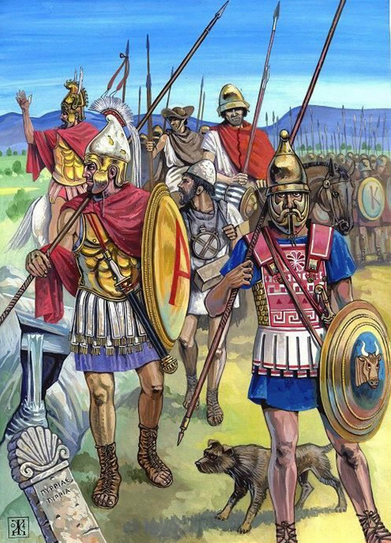
During all this time, however, the Sabines still cherished the spirit of resentment and hostility, and instead of being conciliated by the forbearance and generosity of the Romans, were only excited to greater jealousy and ill-will at witnessing the proofs of their increasing influence and power. They employed themselves in maturing their plans for a grand onset against the new colony, and with the intention to make the blow which they were about to strike effectual and final they took time to arrange their preparations on the most extensive scale, and to mature them in the most deliberate and thorough manner. They enlisted troops; they collected stores of provisions and munitions of war; they formed alliances with such states lying beyond them as they could draw into their quarrel; and finally, when all things were ready, they assembled their forces upon the frontier, and prepared for the onset. The name of the general who was placed in command of this mighty host was Titus Tatius.
In the mean time, Romulus and the people of the city were equally busy in making preparations for defense. They procured and laid up in magazines, great stores of provisions for the use of the city. They strengthened and extended the walls, and built new ramparts and towers wherever they were needed. Numitor rendered very essential aid to his grandson in these preparations. He sent supplies of weapons to him for the use of the men, and furnished various military engines, such as were used in those times in the attack and defense of besieged cities. In fact, the preparations on both sides were of the most extensive character, and seemed to portend a very resolute and determined contest.
When all things were thus ready, the Sabines, before actually striking the blow for which they had been so long and so deliberately preparing, concluded to send one more final embassy to Romulus, to demand the surrender of the women. This was of course only a matter of form, as they must have known well from what had already passed that Romulus would not now yield to such a proposal. He did not yield. He sent back word in answer to their demand, that the Sabine women were all well settled in Rome, and were contented and happy there with their husbands and friends, and that he could not think now of disturbing them. This answer having been received, the Sabines prepared for the onset.
There was a certain tract of country surrounding Rome which belonged to the people of the city, and was cultivated by them. This land was used partly for tillage and partly for the pasturage of cattle, but principally for the latter, as the rearing of flocks and herds was, for various reasons, a more advantageous mode of procuring food for man in those ancient days than the culture of the ground. The rural population, therefore, of the Roman territory consisted chiefly of herdsmen; and when the approaching danger from the Sabines became imminent, Romulus called all these herdsmen in, and required the flocks of sheep and the herds of cattle to be driven to the rear of the city, and shut up in an enclosure there, where they could be more easily defended. Thus the Sabine army found, when they were ready to cross the frontier, that the Roman territory, on that side, was deserted and solitary; and that there was nothing to oppose them in advancing across it almost to the very gates of Rome.
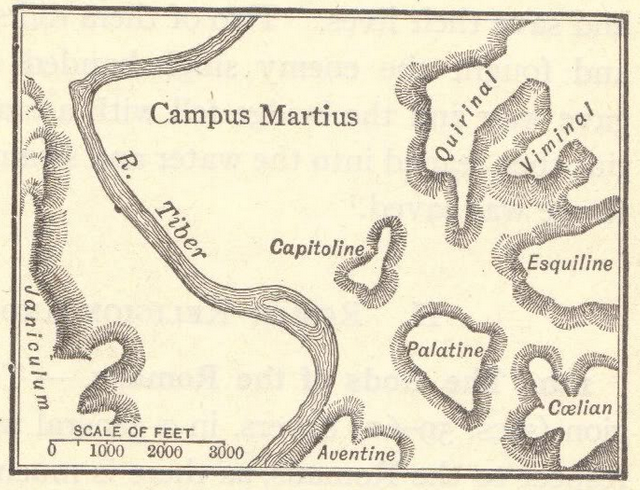
They advanced accordingly, and when they came near to the city they found that Romulus had taken possession of two hills without the walls, where he had entrenched himself in great force. These two hills were named the Esquiline and Quirinal hills. The city itself included two other hills, namely, the Palatine and the Capitoline. The Capitoline hill was the one on which the asylum had formerly been built, and it was now the citadel. The citadel was surrounded on all parts with ramparts and towers which overlooked and commanded all the neighboring country. The command of this fortress was given to Tarpeius, a noble Roman. He had a daughter named Tarpeia, whose name afterward became greatly celebrated in history, on account of the part which she took in the events of this siege, as will presently appear.
At the foot of the Capitoline hill, and on the western side of it, that is, the side away from the city, there was a spacious plain which was afterward included within the limits of the city, and used as a parade-ground, under the name of Campus Martius, which words mean the “War Field.” This field was now, however, an open plain, and the Sabine army advancing to it, encamped upon it. The Sabine forces were much more numerous than those of the Romans, but the latter were so well guarded and protected by their walls and fortifications, that Titus Tatius saw no feasible way of attacking them with any prospect of success. At last, one day as some of his officers were walking around the Capitoline hill, looking at the walls of the citadel, Tarpeia came to one of the gates, which was in a retired and solitary position, and entered into a parley with the men. The story of what followed is variously related by different historians, and it is now difficult to ascertain the actual truth respecting it. The account generally received is this:

Tarpeia had observed the soldiers from the walls, and her attention had been attracted by the bracelets and rings which they wore; and she finally made an agreement with the Sabines that she would open the postern gate in the night, and let them in, if they would give her what they wore upon their arms, meaning the ornaments which had attracted her attention. The Sabines bound themselves to do this and then went away. Titus Tatius, accordingly, when informed of this arrangement detailed a strong detachment of troops, and gave them orders to repair at night in a very silent and secret manner to the gate which had been designated as the place where they were to be let in. It is asserted, however, by some writers, that this apparent treachery on the part of Tarpeia was only a deep-laid stratagem on her part to draw the Sabines into a snare; and that she sent word to Romulus, informing him of the agreement which she had made, in order that he might secretly dispatch a strong force to take their position at the gate, and intercept and capture the Sabine party as soon as they should come in. But if this was Tarpeia’s design, it totally failed. The Sabines, when they came at midnight to the postern gate which Tarpeia opened for them, came in sufficient force to bear down all opposition; and in fulfillment of their promise to give Tarpeia what they wore upon their arms they threw their heavy bucklers upon her until she was crushed down beneath the weight of them and killed.
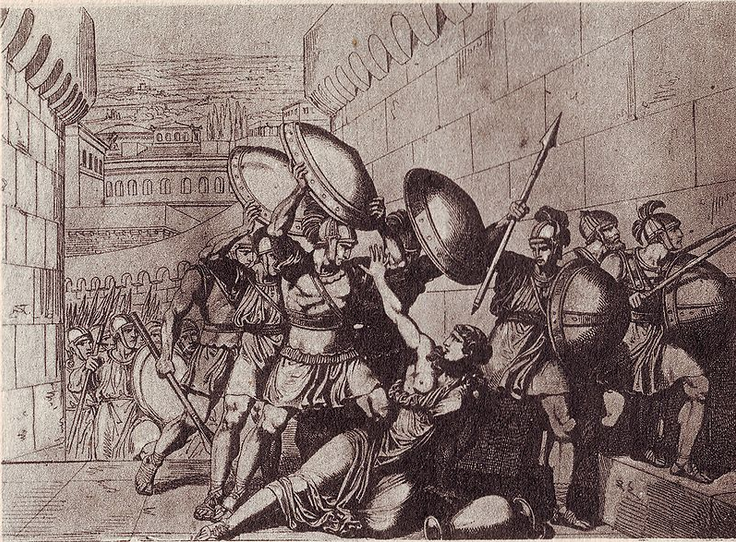
A steep rock which forms that side of the Capitoline hill is called the Tarpeian rock, in memory of this maiden, to the present day.
In this way the Sabines gained possession of the citadel, though Romulus still held the main city. The Romans were of course extremely disconcerted at the loss of the citadel, and Romulus, finding that the danger was now extremely imminent, resolved no longer to stand on the defensive, but to come out upon the plain and offer the Sabines battle. He accordingly brought his forces out of the city and took up a strong position with them, between the Capitoline and Palatine hills, with his front toward the Campus Martius, where the main body of the Sabines were posted. Thus the armies were confronted against each other on the plain, the Romans holding the city and the Palatine hill as a stronghold to retreat to in case of necessity, while the Sabines in the same manner could seek refuge on the Capitoline hill and in the citadel.
Things being in this state a series of desperate but partial contests ensued, which were continued for several days, when at length a general battle came on. During all this time the walls of the city and of the citadel were lined with spectators who had ascended to witness the combats; for from these walls and from the declivities of the hills, the whole plain could be looked down upon as if it were a map. The battle continued all day. At night both parties were exhausted, and the field was covered with the dead and dying, but neither side had gained a victory. The next day by common consent they suspended the combat in order to take care of the wounded, and to bury the bodies of the dead.
After the interval of a day, which was spent, on both sides, in removing the horrid relics of the previous combats, and in gathering fresh strength and fresh desperation and rage for the conflicts yet to come, the struggle was renewed. The soldiers fought now, on this renewal of the battle, with more dreadful and deadly ferocity than ever. Various incidents occurred during the day to give one party or the other a local or temporary advantage, but neither side wholly prevailed. At one time Romulus himself was exposed to the most imminent personal danger, and for a time it was thought that he was actually killed. The Romans had gained some great advantage over a party of the Sabines, and the latter were rushing in a headlong flight to the citadel, the Romans pursuing them and hoping to follow them in, in the confusion, and thus regain possession of the fortress. To prevent this, the Sabines within the citadel and on the rocks above threw stones down upon the Romans. One of these stones struck Romulus on the head, and he fell down stunned and senseless under the blow. His men were extremely terrified at this disaster, and abandoning the pursuit of their enemies they took up the body of Romulus and carried it into the city. It was found, however, that he was not seriously injured. He soon recovered from the effects of the blow and returned into the battle.
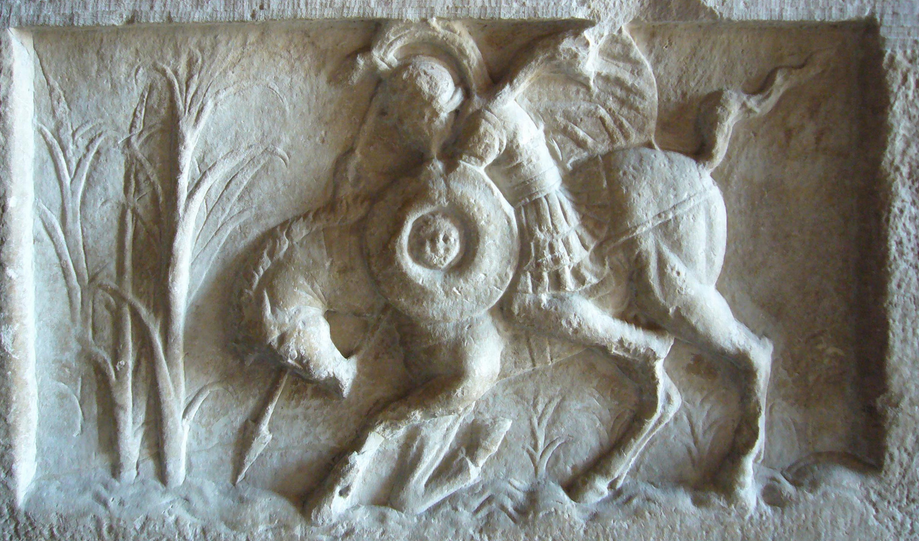
Another incident which occurred in the course of these battles has been commemorated in history, by having been the means of giving a name to a small lake or pool which was afterward brought within the limits of the city. A Sabine general named Curtius happened at one time to encounter Romulus in a certain part of the field, and a long and desperate combat ensued between the two champions. Other soldiers gradually came up and mingled in the fray, until at length Curtius, finding himself wounded and bleeding, and surrounded by enemies, fled for his life. Romulus pursued him for a short distance, but Curtius at length came suddenly upon a small swampy pool, which was formed of water that had been left by the inundations of the river in some old deserted channel, and which was now covered and almost concealed by some sort of mossy and floating vegetation. Curtius running headlong, and paying little heed to his steps fell into this hole, and sank in the water. Romulus supposed of course that he would be drowned there, and so turned away and went to find some other enemy. Curtius, however, succeeded in crawling out of the pond into which he had fallen; and in commemoration of the incident the pond was named Lake Curtius, which name it retained for centuries afterward, when, not only had all the water disappeared, but the place itself had been filled up, and had been covered with streets and houses.
The combats between the Romans and the Sabines were continued for several days, during all which time the Sabine women, on whose account it was that this dreadful quarrel had arisen, were suffering the greatest anxiety and distress. They loved their fathers and brothers, but then they loved their husbands too; and they were overwhelmed with anguish at the thought that day after day those who were equally dear to them were engaged in fighting and destroying one another, and that they could do nothing to arrest so unnatural a hostility.
At length, however, after suffering extreme distress for many days, a crisis arrived when they found that they could interpose. Both parties had become somewhat weary of the contest. Neither could prevail over the other, and yet neither was willing to yield. The Sabines could not bring themselves to submit to so humiliating an alternative as to withdraw from Rome and leave their daughters and sisters in the captors’ hands, after all the grand preparations which they had made for retaking them. And on the other hand the Romans could not take those, who, whatever had been their previous history, were now living happily as wives and mothers, each in her own house in the city, and give them up to an army of invaders, demanding them with threats and violence, without deep dishonor. Thus, though there was a pause in the conflict, and both parties were weary of it, neither was willing to yield, and both were preparing to return to the struggle with new determination and vigor.

The Sabine women thought that they might now interpose. A lady named Hersilia, who is often mentioned as one of the most prominent among the number, proposed this measure and made the arrangements for carrying it into effect. She assembled her country-women and explained to them her plan, which was that they should go in a body to the Roman Senate, and ask permission to intercede between the contending nations, and plead for peace.
The company of women, taking their children with them, all of whom were yet very young, went accordingly in a body to the senate-chamber, and asked to be admitted. The doors were opened to them, and they went in. They all appeared to be in great distress and agitation. The grief and anxiety which they had suffered during the progress of the war still continued, and they begged the Senate to let them go out to the camp of the Sabines, and endeavor to persuade them to make peace. The Senate were disposed to consent. The women wished to take their children with them, but some of the Romans imagined that there might, perhaps, be danger, that under pretense of interceding for peace, they were really intending to make their escape from Rome altogether. So it was insisted that they should leave their children behind them as hostages for their return, excepting that such as had two children were allowed to take one, which plan it was thought would aid them in moving the compassion of their Sabine relatives.
The women, accordingly, left the senate-chamber, and with their children in their arms, their hair disheveled, their robes disordered, and their countenances wan with grief, went in mournful procession out through the gate of the city. They passed across the plain and advanced toward the citadel. They were admitted, and after some delay, were ushered into the council of the Sabines. Here their tears and exclamations of grief broke forth anew. When silence was in some measure restored, Hersilia addressed the Sabine chieftains, saying, that she and her companions had come to beg their countrymen to put an end to the war. “We know,” said she, “that you are waging it on our account, and we see in all that you have done proofs of your love for us. In fact, it was our supposed interests which led you to commence it, but now our real interests require that it should be ended. It is true that when we were first seized by the Romans we felt greatly wronged, but having submitted to our fate, we have now become settled in our new homes, and are contented and happy in them. We love our husbands and love our children; and we are treated with the utmost kindness and respect by all. Do not then, under a mistaken kindness for us, attempt to tear us away again, or continue this dreadful war, which, though ostensibly on our account, and for our benefit, is really making us inexpressibly miserable.”
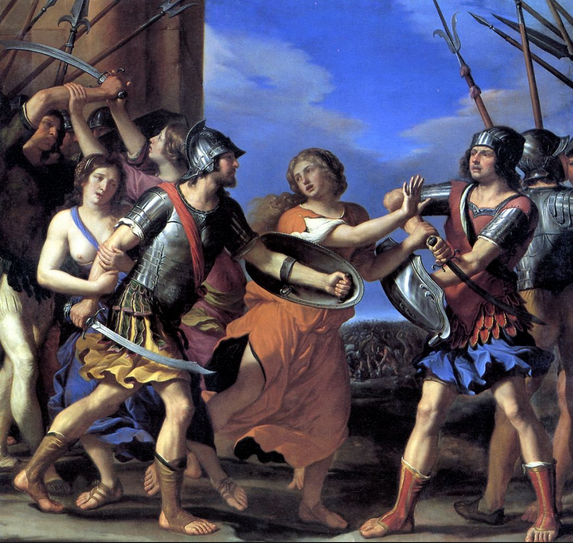
This intercession produced the effect which might have been expected from it. The Sabines and Romans immediately entered upon negotiations for peace, and peace is easily made where both parties are honestly desirous of making it. In fact, a great reaction took place, so that from the reckless and desperate hostility which the two nations had felt for each other, there succeeded so friendly a sentiment, that in the end a treaty of union was made between the two nations. It was agreed that the two nations should be merged into one. The Sabine territory was to be annexed to that of Rome, and Titus Tatius, with the principal Sabine chieftains, were to remove to Rome, which was thenceforth to be the capital of the new kingdom. In a word, never was a reconciliation between two belligerent nations so sudden and so complete.










5